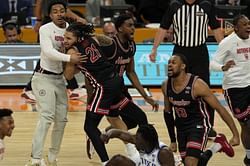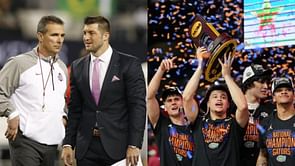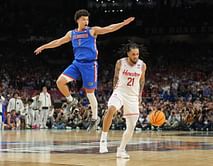
The NCAA Division I men's basketball tournament, known as March Madness, is a single-elimination competition that determines the NCAA college champion. Having been founded in 1939, this yearly event, which includes 68 teams, has become well-known for its unpredictable nature.
The NCAA committee chooses 36 at-large teams, which are announced on Selection Sunday, in addition to the 32 conference winners. Teams compete in seven rounds over a period of three weeks, with seeds ranging from 1 to 16 in four regions. The Final Four play for the national championship after the First Four, Sweet Sixteen, and Elite Eight rounds of the tournament. The famous "One Shining Moment" montage and net-cutting rituals are held to honor the winning team.
No. 1 seed in the March Madness Wins
The No. 1 seed in March Madness has won the most titles, 24, of any other seed. Five is the second-highest score, and it goes to the second seed.
| Year | Champion | Opponent | Score |
| 1987 | 1-seed Indiana | 2-seed Syracuse | 74-73 |
| 1992 | 1-seed Duke | 6-seed Michigan | 71-51 |
| 1993 | 1-seed UNC | 1-seed Michigan | 77-71 |
| 1994 | 1-seed Arkansas | 2-seed Duke | 76-72 |
| 1995 | 1-seed UCLA | 2-seed Arkansas | 89-78 |
| 1996 | 1-seed Kentucky | 4-seed Syracuse | 76-67 |
| 1999 | 1-seed UConn | 1-seed Duke | 77-74 |
| 2000 | 1-seed Michigan State | 5-seed Florida | 89-76 |
| 2001 | 1-seed Duke | 2-seed Arizona | 82-72 |
| 2002 | 1-seed Maryland | 5-seed Indiana | 64-52 |
| 2005 | 1-seed UNC | 1-seed Illinois | 75-70 |
| 2007 | 1-seed Florida | 1-seed Ohio State | 84-75 |
| 2008 | 1-seed Kansas | 1-seed Memphis | 75-68 |
| 2009 | 1-seed UNC | 2-seed Michigan State | 89-72 |
| 2010 | 1-seed Duke | 5-seed Butler | 61-59 |
| 2012 | 1-seed Kentucky | 2-seed Kansas | 67-59 |
| 2013 | 1-seed Louisville | 4-seed Michigan | 82-76 |
| 2015 | 1-seed Duke | 1-seed Wisconsin | 68-63 |
| 2017 | 1-seed UNC | 1-seed Gonzaga | 71-65 |
| 2018 | 1-seed Villanova | 3-seed Michigan | 79-62 |
| 2019 | 1-seed Virginia | 3-seed Texas Tech | 85-77 |
| 2021 | 1-seed Baylor | 1-seed Gonzaga | 86-70 |
| 2022 | 1-seed Kansas | 8-seed North Carolina | 72-69 |
| 2024 | 1-seed UConn | 1-seed Purdue | 75-60 |
Read more: What are seeds in basketball?
How do the No. 1 seeds perform in March Madness?
Following UConn's victory as the top seed in the 2024 NCAA tournament, the number one seeds are 148-1 versus the 16th seeds. However, securing the top seed does not guarantee a spot in the NCAA tournament's second weekend. Illinois lost to No. 8 seed Loyola Chicago in the Round of 32 of the 2021 NCAA Tournament, making history as the 20th top seed to lose in the tournament.
The two opening-weekend defeats by top seeds Virginia and Xavier in 2018 served as vivid reminders of the scares that top seeds have had in the past. These losses contrasted sharply with the journeys to the Final Four made by the other two No. 1 seeds that season, Villanova and Kansas.
Consider the 1989 tournament, where two No. 1 seeds, Georgetown and Oklahoma, narrowly avoided elimination from the first round. By a single point apiece, the Hoyas and Sooners upset East Tennessee State and Princeton, respectively. After being in a similar situation the previous year, Michigan State overcame Murray State 75–71 in overtime.
Though the first round of a tournament always seems to favor the top seed, anything can happen over the remaining rounds. Even with the overwhelming numbers, only 2008 has seen all four No. 1 seeds appear in the Final Four.
Discover: March Madness Year on Year winner list.
FAQs on March Madness
A. Yes, the No. 1 seed has won the NCAA tournament 24 times, with the most recent being UConn in 2024.
A. Only in 2008 did all four No. 1 seeds appear in the Final Four.
A. Yes, when UMBC defeated Virginia in 2018, they became the first 16-seed to upset a No. 1 seed in history. By beating Purdue in March Madness 2023, FDU became the second 16-seed to defeat a No. 1 seed.
A. In 2018, two No. 1 seeds, Virginia and Xavier, suffered opening-weekend defeats, highlighting the unpredictability of March Madness.









